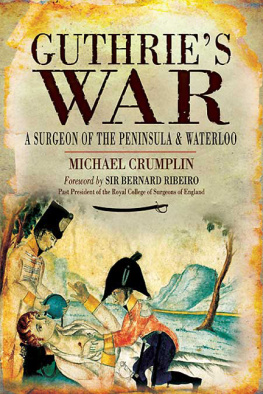First published in Great Britain 1997,
Reprinted 1998, by
LEO COOPER
an imprint of Pen & Sword Books Ltd,
47 Church Street
Barnsley
South Yorkshire
S70 2AS
Stanley Monick, 1997, 1998
ISBN 0 85052 565 9
A catalogue record for this book is
available from the British Library
Printed in Great Britain by
Redwood Books, Trowbridge, Wiltshire
In his history of The Royal Scots A. M. Brander makes a brief reference to the memoirs of one John Douglas, who served for some years as a Corporal, and later a Sergeant, in the 3rd Battalion and fought with it at Walcheren, in the Peninsula and at Waterloo. The memoir is entitled Douglass Tale of the Peninsula and spans the years 180917. It ends with the return of the battalion from the Army of Occupation in France for disbandment at Canterbury in April, 1817.
The memoir may be described as a monograph with many of the characteristics of the picaresque novel. It is episodic in form, making no serious attempt to present a detailed account of the battles of which the author is writing but rather to provide a view of events as seen through his own eyes. One of his aims in writing the memoir was to bring home to those who had no experience of the soldiers life and hardships on campaign just how much the marching infantryman had to endure for his countrys sake.
Douglas was a well-educated, articulate and literate man who was a shrewd judge of character and of all that went on around him a most unusual man to find in the ranks of an army largely recruited from the poorest levels of society among whom illiteracy was common and educational standards extremely low. His memoir is contained in a leather-bound volume of 172 pages of which the first thirty consist of a scrupulously researched history of his regiment. These are not reproduced in this book which is concerned with Douglas himself. The text is written in a fine and completely legible copper-plate handwriting, a clear indication of his educational background and possibly of the five-year apprenticeship which he had completed just before he enlisted on what seems like a sudden whim, despite the fact that his friends came forward most handsomely with their purses to set me up in business on my own account. Although there is no definite indication of the date at which the memoir was written, the fact that Douglas refers to published work that did not appear until the late 1830s suggests that he was writing some twenty-five or thirty years after the events described took place, possibly in the middle of the 1840s.
John Douglas was born in Lurgan, some twenty miles from Belfast, in about 1789. He came from a distinguished and aristocratic lineage, dating back to the first Earl Douglas of Drumlanrig whose title dated from 1358 and whose descendants featured prominently in Scottish history, the title finally passing to the Dukes of Hamilton in 1761. However, there can be little doubt that Douglas himself was born into a more modest branch of the family, well removed from those aristocratic links, but who nevertheless had the resources to give him the education that he had clearly enjoyed and to put him through his apprenticeship. The date of his death is not known but there is an interesting clue to the fact that he was still alive in 1848. His Waterloo Medal and Military General Service Medal, bearing the clasps Busaco, Fuentes De Onro, Salamanca, Vittoria, San Sebastian, Nivelle and Nive, are now in the South African Museum of Military History in Johannesburg. The General Service Medal was only authorized in 1847 and issued in the following year. No posthumous issues were made so that many of the names appearing in the memoir are missing from the medal roll. Douglas was certainly a strong and very resilient man, for, despite having nearly lost a leg at San Sebastian, he was back in the battalion at Quatre Bras and Waterloo, so we may fairly hope that he lived to a good old age. The rims of both his medals are inscribed with his name in the rank of Corporal, so it is clear that he had not been promoted Sergeant by the time of Waterloo. However, in the Epilogue (page 105) he speaks of a fellow Sergeant whilst at Canterbury (March or April, 1817) so it seems likely that he was promoted while in France, after the battle.
Douglas was a natural storyteller and raconteur, so the memoir makes wonderful reading and gives us a word picture of life in the Peninsula that no plain work of history could hope to provide. The episodes he describes range from the horrific to the farcical from the rape of Busaco to his own encounter with a drunken naval Master-at-Arms. While his description of life on the march and in the field leaves little to the imagination in terms of the suffering and hardships which he and his comrades endured desperate hunger when the Commissariat had failed to keep up with the army, the agonies of marching mile after mile barefoot when no new boots were available, sleepless nights spent soaked to the skin and lying on the bare earth under the stars after a hard days march in pouring rain, and nights on which, despite some form of tentage, they awoke with their hair frozen to the grass his tales of battle sometimes seem curiously matter-of-fact, written almost as if it was all something of a horrendous game, all part of the days work, yet invariably reflecting that marvellous soldiers sense of humour without which the stress of battle could not long be endured. From time to time, however, he underlines the extreme dangers they faced and the stoic courage with which the British line would advance against the French guns and musketry in perfect order, despite the heavy casualties, or the fearful carnage inseparable from siege warfare. A man of deep religious convictions and a strong sense of natural justice, he felt extremely bitter at the way an ungrateful nation treated its old soldiers when their long years of service and sacrifice were over, often leaving them disabled or in poor health and unable to find work, yet receiving little or no financial recompense.
Apart from the two world wars of the 20th Century, no war in our history has yielded a more extensive literature than the war in the Peninsula. There are a great number of well-written memoirs and histories from the pens of officers of every seniority, but memoirs of the quality of Douglass Tale from a soldier who served in the ranks are rare indeed and enable us to see the war through entirely different eyes.
Douglass text has been reproduced as it was written. Editorial interference has been strictly confined to the inclusion or excision of a word or phrase which was found necessary in the interests of clarity. Similarly, because Douglas had little love for full stops or semi-colons, the text has been repunctuated in some places, again in the interests of clarity. Douglass nine chapters have been compressed into six and section headings to indicate a switch of scene or subject have been introduced.
To provide some historical continuity and give a background to the events about to be described, a short historical note has been introduced at the start of each chapter. The Chapter Notes are only intended to clarify points in the text or to explain the significance of some situation or remark to the reader who has no previous knowledge of the military history of the period. Douglas used a small number of footnotes. These have been included amongst the Chapter Notes and endorsed Authors Note. A short Select Bibliography has been included for the use of the reader who wishes to study the campaigns in more depth or to learn something of the organization, equipment and tactics of the British armies under Wellington.





